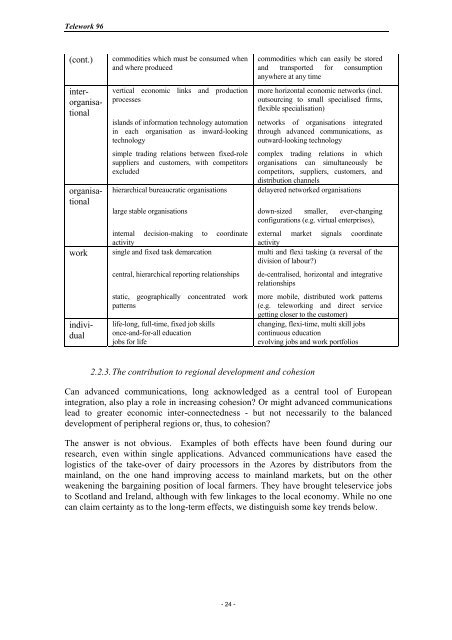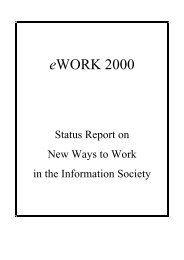1996 - European Telework Week
1996 - European Telework Week
1996 - European Telework Week
- No tags were found...
Create successful ePaper yourself
Turn your PDF publications into a flip-book with our unique Google optimized e-Paper software.
<strong>Telework</strong> 96<br />
(cont.)<br />
commodities which must be consumed when<br />
and where produced<br />
vertical economic links and production<br />
processes<br />
islands of information technology automation<br />
in each organisation as inward-looking<br />
technology<br />
simple trading relations between fixed-role<br />
suppliers and customers, with competitors<br />
excluded<br />
hierarchical bureaucratic organisations<br />
commodities which can easily be stored<br />
and transported for consumption<br />
anywhere at any time<br />
more horizontal economic networks (incl.<br />
outsourcing to small specialised firms,<br />
flexible specialisation)<br />
networks of organisations integrated<br />
through advanced communications, as<br />
outward-looking technology<br />
complex trading relations in which<br />
organisations can simultaneously be<br />
competitors, suppliers, customers, and<br />
distribution channels<br />
delayered networked organisations<br />
large stable organisations down-sized smaller, ever-changing<br />
configurations (e.g. virtual enterprises),<br />
internal decision-making to coordinate<br />
activity<br />
external market signals coordinate<br />
activity<br />
work single and fixed task demarcation multi and flexi tasking (a reversal of the<br />
division of labour)<br />
interorganisational<br />
organisational<br />
individual<br />
central, hierarchical reporting relationships<br />
static, geographically concentrated work<br />
patterns<br />
life-long, full-time, fixed job skills<br />
once-and-for-all education<br />
jobs for life<br />
de-centralised, horizontal and integrative<br />
relationships<br />
more mobile, distributed work patterns<br />
(e.g. teleworking and direct service<br />
getting closer to the customer)<br />
changing, flexi-time, multi skill jobs<br />
continuous education<br />
evolving jobs and work portfolios<br />
2.2.3. The contribution to regional development and cohesion<br />
Can advanced communications, long acknowledged as a central tool of <strong>European</strong><br />
integration, also play a role in increasing cohesion Or might advanced communications<br />
lead to greater economic inter-connectedness - but not necessarily to the balanced<br />
development of peripheral regions or, thus, to cohesion<br />
The answer is not obvious. Examples of both effects have been found during our<br />
research, even within single applications. Advanced communications have eased the<br />
logistics of the take-over of dairy processors in the Azores by distributors from the<br />
mainland, on the one hand improving access to mainland markets, but on the other<br />
weakening the bargaining position of local farmers. They have brought teleservice jobs<br />
to Scotland and Ireland, although with few linkages to the local economy. While no one<br />
can claim certainty as to the long-term effects, we distinguish some key trends below.<br />
- 24 -








